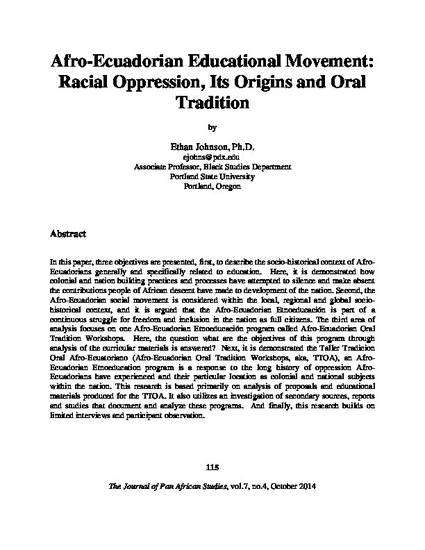
- African Americans,
- Ecuadorian Americans,
- Social Movements,
- Race,
- Social Classes,
- Social Sciences -- Research
In this paper, three objectives are presented, first, to describe the socio-historical context of Afro-Ecuadorians generally and specifically related to education. Here, it is demonstrated how colonial and nation building practices and processes have attempted to silence and make absent the contributions people of African descent have made to development of the nation. Second, the Afro-Ecuadorian social movement is considered within the local, regional and global socio-historical context, and it is argued that the Afro-Ecuadorian Etnoeducación is part of a continuous struggle for freedom and inclusion in the nation as full citizens. The third area of analysis focuses on one Afro-Ecuadorian Etnoeducación program called Afro-Ecuadorian Oral Tradition Workshops. Here, the question what are the objectives of this program through analysis of the curricular materials is answered? Next, it is demonstrated the Taller Tradicion Oral Afro-Ecuatoriano (Afro-Ecuadorian Oral Tradition Workshops, aka, TTOA), an Afro-Ecuadorian Etnoeducation program is a response to the long history of oppression Afro-Ecuadorians have experienced and their particular location as colonial and national subjects within the nation. This research is based primarily on analysis of proposals and educational materials produced for the TTOA. It also utilizes an investigation of secondary sources, reports and studies that document and analyze these programs. And finally, this research builds on limited interviews and participant observation.
